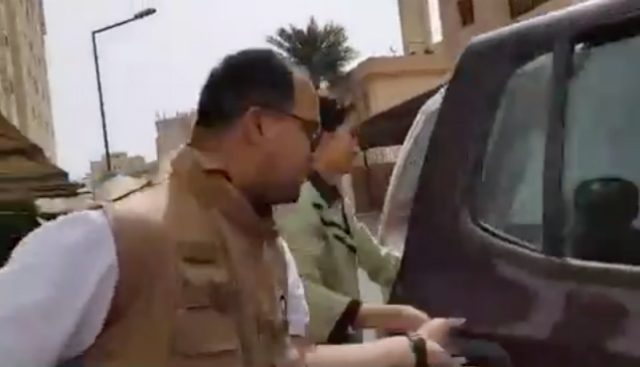SUMMARY
This is AI generated summarization, which may have errors. For context, always refer to the full article.

MANILA, Philippines – “Knock and request.”
This is the literal meaning of “Tokhang,” a contraction of the Visayan words “toktok” (knock) and “hangyo” (request).
Tokhang is how the Duterte administration undertakes its bloody anti-drug campaign. In operations called Oplan Tokhang, policemen knock on the homes of drug suspects, and request them to surrender.
If drug suspects violently resist arrest, that is when policemen shoot at them. Human rights defenders, however, say many suspects do not actually fight back, but police manufacture evidence to justify the extrajudicial killings (EJKs) of drug suspects.
Except for the link to EJKs, Tokhang – or to “knock and request” – was how the Philippine embassy rescued abused overseas Filipino workers (OFWs) in Kuwait.
These rescue operations, though said to be necessary because OFWs suffer abuses, angered Kuwait after the DFA publicized it through now-viral videos.
Kuwait on Wednesday, April 25, expelled Philippine Ambassador to Kuwait Renato Villa because of “undiplomatic acts by Philippine embassy staff.”
Teams dispatched by Cayetano
In a press release on April 19, the DFA detailed how they rescued OFWs in Kuwait.
The DFA said the rescues have been done by personnel from the Philippine embassy “supported by augmentation teams from the Office of Migrant Workers’ Affairs.”
The augmentation teams were led by Executive Director Raul Dado and “were dispatched to Kuwait by Foreign Affairs Secretary Alan Peter S. Cayetano.”
Read an excerpt from the DFA’s press release about the rescue teams:
These teams are dispatched in response to information received from the distressed Filipinos themselves or from members of the Filipino Community.
Executive Director Dado says his teams would proceed to the given address, knock, and request the employer to present the Filipino worker.
If the household service worker has injuries, Kuwaiti police are immediately called in and the Embassy takes custody of the Filipino.
While rescues require police assistance, there are cases when Executive Director Dado’s teams have to do it on their own, especially in cases of sexual and physical abuse.
‘Policeman in another country’
The DFA also released videos of these rescue operations.
It was those cases when rescue teams “have to do it on their own” that angered Kuwaitis.
In an interview with ANC on Thursday, former Philippine ambassador Apolinario Lozada Jr said he can imagine the “degree of hurt that the Kuwaitis felt” with how the Philippine embassy rescued OFWs in the private homes of Kuwaiti nationals.
“That is a no-no-no in diplomacy. That’s beyond the powers and duties and responsibilities of an ambassador assigned in any country. You cannot be a policeman in another country’s territory,” Lozada said.
Arnell Ignacio, deputy administrator of the Overseas Workers Welfare Administration, said the rescues, which were illegal in Kuwait, should have been “covert” operations. He said the rescue videos, at least, should not have been uploaded.
Referring to Kuwait’s laws, Ignacio said, “Kung iva-violate mo rin lang, ‘wag mo nang i-video at i-post.“ (If you will violate it anyway, then don’t take a video and post it.)
‘We did not violate Kuwaiti law’
In a press conference in Singapore on Thursday, Philippine Foreign Secretary Alan Peter Cayetano stressed that the Philippines did not violate Kuwait’s laws.
“We still did not violate Kuwaiti law. We did not go into the houses. We did not take the law into our own hands,” Cayetano said.
He said 68 Filipino domestic workers had been rescued this way, while around 132 other Filipinos still need to be rescued to this day.
In a separate press conference in Kuwait aired on Saturday, April 21, Villa was asked about allegations that the Philippines “took maids from houses.”
Villa answered: “We do not take our workers from inside the houses. We do not knock on doors, we do not go inside the houses. We do not do that.”
“But you took them from outside,” asked a woman in the press conference. Villa murmured, did not expound, and moved on to the next question.
Cayetano on Tuesday, April 24, however apologized for rescues done “in the spirit of emergency action to protect Filipinos.”
A day later, Kuwait not only expelled Villa, but declared him persona non grata. – Rappler.com
Add a comment
How does this make you feel?
There are no comments yet. Add your comment to start the conversation.